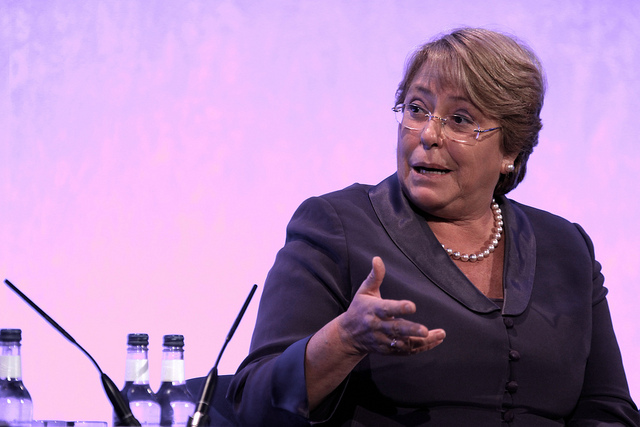Chile’s (Aa3 stable) strong macroeconomic fundamentals, the sound credit fundamentals of its banks, and the market positions and access to funding for its rated non-financial companies will help the sovereign maintain its credit quality despite slowing growth stemming from domestic factors and a drop in global commodities prices, says Moody’s Investors Service.
Chile derives its fiscal strength, which ranks among the strongest of all sovereign issuers that Moody’s rates globally, from its low debt metrics and policy stability, according to the report “Credit Quality in Chile: Banking, Corporate Sectors Poised to Withstand Slow Growth, Policy Shifts.”
Contrary to market concerns, none of Chilean President Michelle Bachelet’s proposed policy changes appear likely to affect Chile’s main debt metrics, nor is the administration changing the country’s key macroeconomic and fiscal policies. The president has pursued an aggressive agenda including new taxes, changes to the education system, and possibly constitutional reform later in 2015, and both the pace and nature of the reforms have raised questions about a possible shift in Chile’s longstanding fiscal policy. Nevertheless, Chile’s growth through mid-2016 will be close to the median among its regional peers, with a low debt burden and among the strongest fiscal positions of any rated sovereign issuer worldwide. The administration believes the tax reform will increase government revenues by 2%-3% of GDP by 2018.
“While the record-low approval ratings of President Michelle Bachelet and her aggressive reform agenda threaten to upend the political stability that has dominated since Chile returned to democracy in 1989, neither will cause Chile’s debt burden to increase during President Bachelet’s term,” says Marianna Waltz, a Moody’s Managing Director. “Most of the proposed changes would be funded by increasing tax revenues, a credit benefit because it will not raise the country’s debt burden.”
Credit quality still fundamentally strong for Chile’s banks
The credit quality of Chile’s banks remains similarly strong as a result of their ample access to funding. The banks are increasingly using the local capital market to support loan growth.
Chile’s banks continue to exhibit sound credit fundamentals despite the country’s maturing investment cycle and softer domestic demand, as well as uncertainty caused by the new government’s reform agenda. Emerging political issues appear unlikely to have any direct effects on the performance of Chile’s banking system. While asset quality will likely deteriorate slightly amid economic uncertainty, the country’s banks have access to ample funding today.
“Delinquencies will rise slightly amid slow economic growth, but proactive management of credit growth, asset allocation and reserves will help limit problems with asset quality,” says Waltz. Chilean banks will continue to enjoy ample access to funding sources as the economy begins to strengthen.
Reforms and weak commodity prices reduce consumption and investments
Furthermore, Chile’s rated non-financial companies all have strong market positions and access to uncommitted local bank funding, and will maintain their good access to international sources, even if reduced investment makes it less necessary.
Chile’s slowing growth will strain profitability and demand through at least mid-2016 for domestic retailers, which rely on consumption, and weak commodities prices and rising production costs will constrain profitability for copper producer CODELCO in Chile’s crucial mining sector. But operating income for pulp producers Arauco and Inversiones CMPC will improve through at least mid-2016, partly from the peso’s depreciation and partly from increased volume from recent capacity additions and higher hardwood pulp prices.
Moody’s expects GDP growth to improve in 2015-16 despite the challenges of weaker investment this year.



 By Fórmate a Fondo
By Fórmate a Fondo